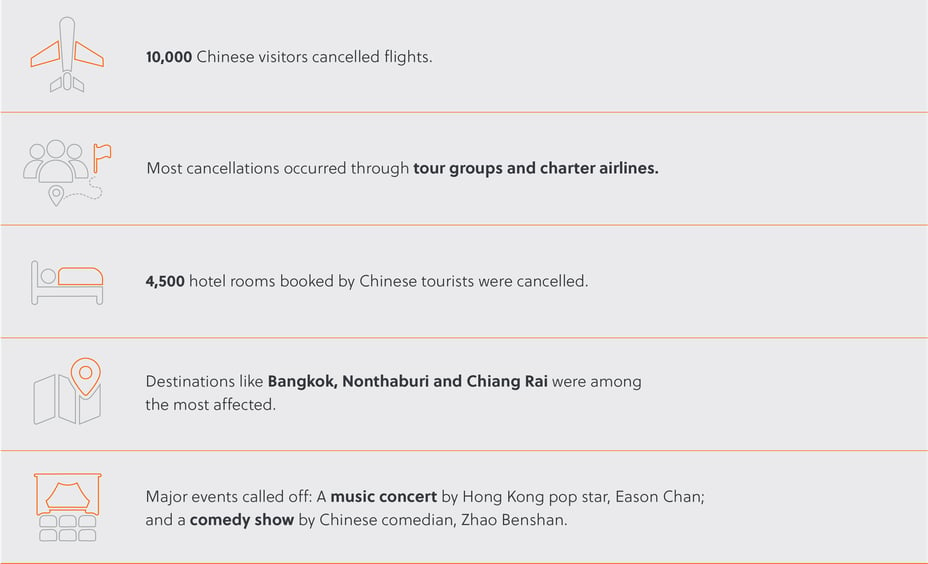A recent high-profile kidnapping in Thailand has shone a renewed spotlight on ‘scam compounds’ flourishing in South Asia’s organised crime industry, with repercussions for Thailand’s reputation as a safe destination for foreign – and particularly Chinese – visitors, writes Tamsin Hunt.
Well educated, multilingual, and in search of better job opportunities – this is a typical profile of the individuals often targeted for kidnappings by human trafficking networks looking to staff hundreds of well-established scam compounds situated across South Asia. These compounds – operated by transnational criminal organisations, often with links to Chinese crime syndicates – generate billions of US dollars every year, facilitated by thousands of abductees forced to perpetrate illegal online scams, money laundering and gambling schemes. Most abductions begin with recruitment fraud; fake companies convince people to travel to Bangkok and other cities, often assuring them of high-paying jobs and other benefits. On arrival, the ‘employees’ are usually met by a seemingly official company shuttle, and transported north to Myanmar to one of the numerous scam compounds situated along the border, where the abductees are then held indefinitely as forced labour. Further demonstrating the perceived legitimacy of these companies, many victims reportedly only notice that something is wrong as they approach or cross the border.
Growing concerns dampen travel enthusiasm
Traffickers target victims from around the world, but Chinese jobseekers are disproportionally affected. As such, the regional scam industry – expanding at pace since 2020 – and the growing need for staffing at these compounds has long been a cause for concern among China’s public. Then, in January 2025, the high-profile abduction of Chinese actor Wang Xing catapulted the issue into the public spotlight. Wang Xing flew to Bangkok on 3 January for what he believed to be a casting call at the invite of a major Thai film production company. He was escorted through airport security, before being driven 500 km to the Myanmar border. A social media campaign soon erupted demanding intervention from Thai authorities – and other regional governments – and Wang was rescued days later.
The campaign, however, soon grew into a larger movement calling on the Thai government to rescue all victims and shut down the scam compounds. Amid wider scrutiny from travellers and commercial operators in Thailand’s tourism sector, the country experienced a surge in flight and hotel room cancellations among prospective Chinese visitors, particularly during the 15-day Lunar New Year holiday period in January. Travel operators and tourists cited a loss of confidence in Thailand’s security environment, while many of those that chose to travel reported concerns around Chinese-speaking strangers – drivers and tour guides, for instance – over perceptions that they may be associated with the Chinese criminal networks that control a large part of the scam industry.
Impact on Thailand’s tourism sector in January and February 2025

A reinvigorated government response
Thai authorities have implemented several strategies to expand tourism numbers over the last year, including dropping all visa requirements for visitors from 93 countries since March 2024. With Chinese tourism being a critical revenue source for Thailand (accounting for approximately 20 percent of the country’s foreign visitors in 2024), Wang’s abduction prompted the government to launch a campaign to reassure Chinese travellers; they established the new Tourist Safety Operations Centre, and launched the Thailand Tourist Police App, which allows for data sharing between foreign visitors and police in an emergency. Thailand has also intensified efforts to clamp down on scam compounds across its border with Myanmar, cutting electricity, internet and gas supply to Myanmar’s border towns like Myawaddy, Payathonzu, and Tachilek, which function as known havens for criminal syndicates. In a joint operation with Chinese and Myanmar security forces in mid-February, Thai authorities freed 7,000 trafficking victims from multiple scam centres along the border.
These victims, however, are just a drop in the ocean in a scamming industry estimated to house upward of 300,000 victims in Myanmar, Cambodia and Laos alone. And despite Thai authorities’ efforts to address Thailand’s ongoing role as a transit hub for human trafficking, challenges remain amid wider regional dynamics as neighbouring countries continue to offer permissive environments – lacking strong security or regulatory frameworks and enforcement capabilities – for fast expanding criminal organisations.
The Thai government’s previous attempts at clamping down on these networks have often lost momentum, faced with significant resistance from the domestic tourism sector and large Chinese business communities over concerns around the negative reputational effects on Thailand’s legitimate business interests. The government’s latest crackdown, while seemingly productive, also includes few indications of a long-term strategy, with most rescued victims now stranded in army camps along the border while their home countries organise repatriation.
Reputation is everything
Tens of thousands of foreign tourists continue to travel to Thailand every day, and the National Economic and Social Development Council projects that 38 million people will visit the country in 2025, close to the record-breaking 40 million arrivals in 2019 prior to the Covid-19 pandemic. In this context, the latest dip in Chinese visitors is comparatively small, and likely to be short lived.
However, recent government efforts are unlikely to eradicate scam compounds and decrease wider scam-driven abductions. Thailand’s tourism and hospitality sector will therefore remain vulnerable, not only to periodic drops in Chinese tourism revenue, but also to the potential reputational impact and longer-term loss of attraction for the sector, as further highly publicised abductions continue to attract greater media attention and public anger.




